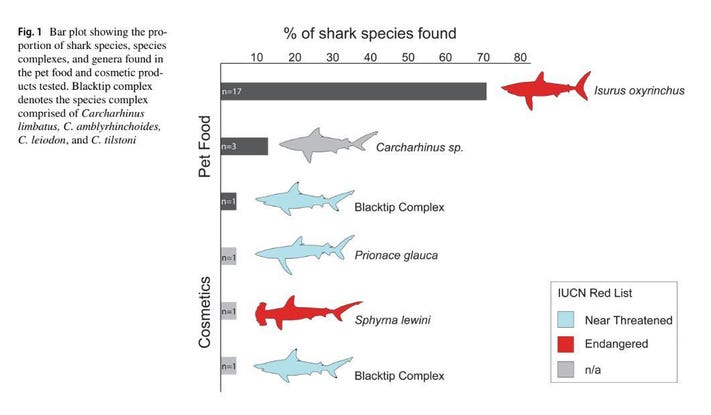It’s not that Koi fish have teethed, escaped from the sewer and evolved into ocean killers, but whether you have Koi or aquarium fish, including other pets such as dogs, cats, birds, Rats may be indirectly causing the extinction of some rare shark species in the ocean.
That’s because their food is being mixed into the shark’s meat, which has long been unknown to consumers and even management agencies and conservation units. The truth was only revealed after a team of researchers at the National University of Singapore traced the DNA contained in the cans of animal food they bought at the supermarket.

The results showed that one in three samples contained DNA from sharks, even shark species listed in the Red Book. The researchers suspect some pet food manufacturers are helping shark poachers get their fins.
Every year, around the world, about 70 million sharks are hunted for their fins. But if you just take the fins, their meat will go to waste. As a result, poachers will often grind shark meat and sell it back to pet food companies.
Companies will deftly heat these pieces of meat, on the one hand, to disinfect and fungus. On the other hand, the process also breaks DNA strands and obscures the clear origin of the meat so that no one knows they are using shark meat.
What is fish meal in pet food products?
If you read the ingredients on pet food cans, you’ll see that they have very generic ingredients. In addition to macronutrients such as protein, fat, carbohydrates, trace elements such as iron, zinc… the manufacturer will also list unclassified ingredients, from “fish”, “fish meal”. ” to “white fish”, “ocean fish”… as a way to promote the natural origin of their products.
Usually, manufacturers will write down common fish as “tuna” or “salmon” to raise the price of the product. But with shark meat, it’s the opposite, they will write them down to blur the trace.
Singaporean scientists discovered this when they collected 45 samples of pet food products of Thai origin, labeled with 16 different popular brands, and analyzed the DNA contained therein.
With that said, the heat treatment of the feed producer will break most shark DNA if their meat is used. But researchers have a way to recover them.
They used PCR gene amplification (similar to testing for COVID-19) to multiply the number of tiny fragments of shark DNA left over. The researchers would then extract these DNAs and compare them with a shortened DNA barcode list of known shark species.
The results showed that 31% of the pet food samples they collected on the market contained shark DNA. In some cases, these DNA codes match shark species that are classified as endangered by the International Union for Conservation of Nature (IUCN).
For example, the Blue Shark (Prionace glauca) occurred up to seven times, the most common among the test samples being classified as Vulnerable by the IUCN. Other studies have shown blue sharks are often caught for their fins. Samples of shark fin products in Southeast Asia are often also derived from blue sharks.
Combined, this evidence suggests that pet food producers in Southeast Asia are consuming by-products from the shark fin processing industry. This will prevent blue sharks from being found, after they have been killed for their fins.

After the blue shark, the silky shark (Carcharhinus falciformis) and the white-headed coral shark (Triaenodon obesus) are the next most common species used as pet food. In total, the Singaporean researchers found nine species of sharks in all, including the spotted-tailed shark (C. sorrah), the red-eyed shark (Loxodon macrorhinus) and the sand tiger shark (Carcharias taurus).
They also identified 16 product samples containing DNA from sharks, but were unable to identify the species because the DNA samples were too heavily damaged. DNA comparison could only identify their genus as Carcharhinus.
Choose your pet food wisely and you’re doing your part to shark conservation
Although pet food companies do not specifically mention shark meat in their products as legal or not, scientists suspect with the ambiguity in product labels, it is more likely manufacturers have an incentive to conceal their origin. This may be due to the movement to protect the environment and marine life, causing many pet owners to refuse to buy products derived from sharks.
“Terms like “ocean fish” are preventing pet owners from making “informed and conscious decisions” about what they feed their animals“, the scientists wrote.We think many pet owners and hobbyists will be alarmed when they discover they are potentially abetting unsustainable fishing practices.”

In fact, ocean shark populations have declined by as much as 71% since 1970, and three-quarters of shark species are now considered globally endangered. In that context, “Pet food is clearly not a worthy use for these sharks“, the researchers wrote.
“We need to take steps to force pet food manufacturers to better label their products, to avoid ambiguous summary terms being used as they are today, thereby allowing consumers to make informed decisions. more informed choices. This will benefit shark populations by helping to reduce unsustainable fishing and resource use inconsistent with their conservation.”
Refer Sciencealert
